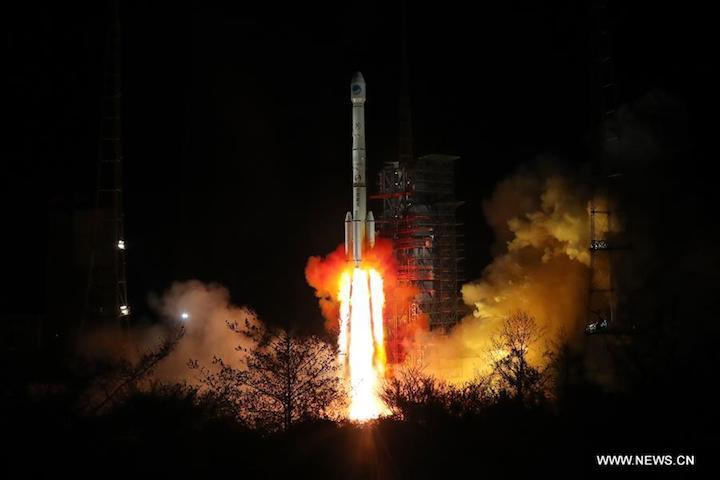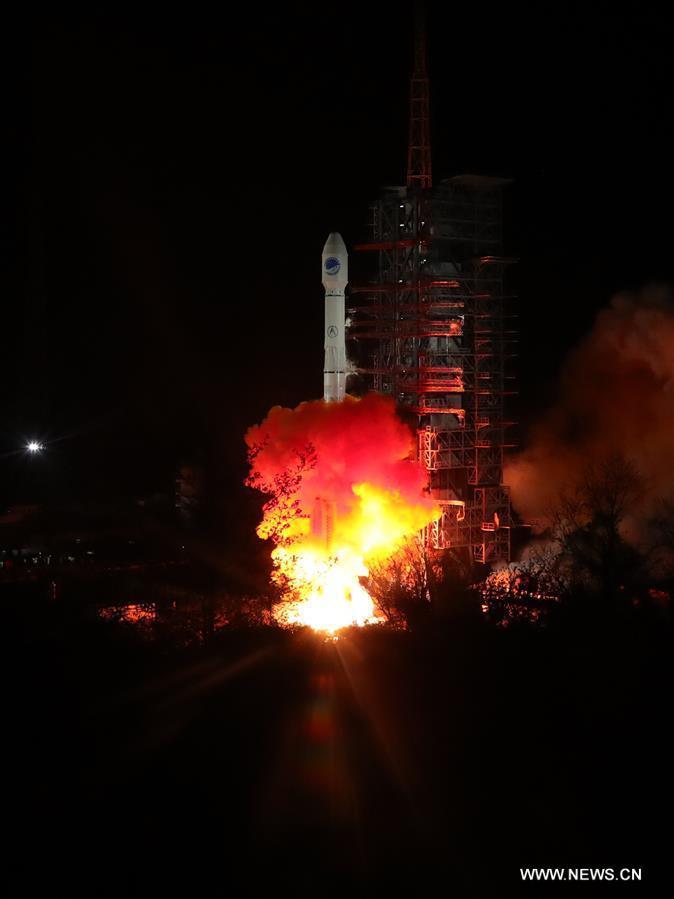
A Beidou-3 positioning and navigation satellite, to be launched into medium Earth orbit.
30.03.2018

China sends twin satellites into space with a single carrier rocket, adding two more members for its domestic BeiDou Navigation Satellite System (BDS), in Xichang of southwest China's Sichuan Province, on March 30, 2018. (Xinhua/Liang Keyan)
-
XICHANG, Sichuan, China on Friday sent twin satellites into space with a single carrier rocket, adding two more members for its domestic BeiDou Navigation Satellite System (BDS).
The Long March-3B carrier rocket lifted off from Xichang Satellite Launch Center in southwest China's Sichuan Province at 1:56 a.m. The launch was the 269th mission for the Long March rocket family.
The twin satellites are coded as the 30th and 31st satellites in the BDS.
They entered orbit more than three hours after the launch and will work together with six previously launched BeiDou-3 satellites once they pass a series of tests.
The satellites and the rocket for Friday's launch were developed by the Innovation Academy for Microsatellites at the Chinese Academy of Sciences and China Academy of Launch Vehicle Technology, respectively.
Named after the Chinese term for the Big Dipper, the BeiDou system started providing independent services over China in 2000 and will serve countries along the Belt and Road by the end of 2018.
By around 2020, when the BDS goes global, it will have more than 30 satellites.

Quelle: Xinhua
+++
China launched its latest duo of Beidou satellites from Xichang on Friday, as the country continues constructing its own positioning and navigation system to rival GPS and others.
Launch via Long March 3B rocket took place at 01:56 Beijing time Friday (17:56 UTC Thursday) from the Xichang Satellite Launch Centre in the southwest of the country.
The satellites were inserted into the desired medium Earth orbits by a Yuanzheng-1 upper stage more than three hours after launch, with CASC, China's main aerospace contractor, then confirming success.
The satellites were developed by the Innovation Academy for Microsatellites at the Chinese Academy of Sciences (CAS), while the China Academy of Launch Vehicle Technology (CALT) under CASC provided the Long March 3B launch vehicle.
China launches twin Beidou navigation satellites into space
The satellites launched were the seventh and eighth - and the 30th and 31st Beidou satellites overall - of the third phase of deployment of the Beidou system.
The satellites, which join six others orbiting at around 21,000 km above the Earth, will help expand Beidou navigation, positioning and timing services from regional to global coverage by 2020.
The Beidou navigation system is China's answer to the US Global Positioning System (GPS), Russia's GLONASS and Europe's Galileo GNSS constellations.
As well as civilian applications such as navigation for shipping and road traffic, and mapping and surveying, Beidou will provide the People's Liberation Army military assistance from space in targeting, positioning and locating, and synchronising operations.
The Beidou phase 3 satellites are based on a new bus featuring a phased array antenna for navigation signals and a laser retroreflector, with a launch mass of 1,014 kg.

A Beidou-3 positioning and navigation satellite, to be launched into medium Earth orbit.
The mission was China's ninth launch in 2018, and third Beidou satellite mission. CASC says it plans 10 Beidou satellite launches this year, with eight of these set to be dual launches to MEO.
Overall, China could launch around 40 times in 2018 - nearly double the national record of 22 set in 2016 - with the next launch set for Saturday from the Taiyuan launch centre.
The launch on Friday was the 269th launch overall for the Long March families of rockets.

Preparations for launch of the Beidou-3 M5 and M6 satellites via Long March 3B from Xichang Satellite Launch Centre in Sichuan Province in March 2018.